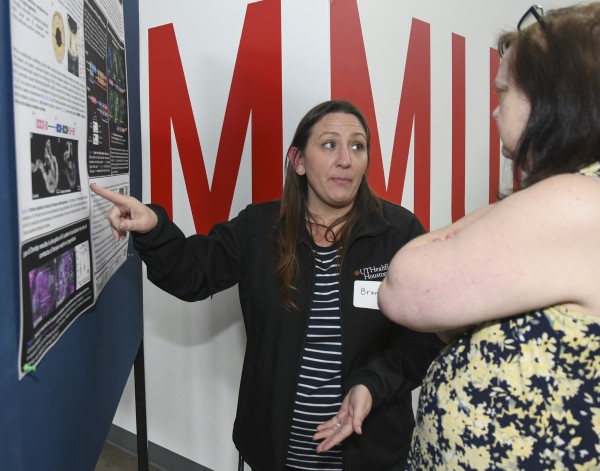New PRC Collaborative Research Endeavors
Miller Lab Updates

Rachel Miller, PhD, (far right) with lab team and collaborators, including Lydia Youmans, MD (second from left)
Pediatric Research Center Associate Professor Rachel Miller, PhD, leads a team of award-winning researchers to explore congenital anomalies of the kidney and urinary tract. The Miller Lab has received some collaborative awards to advance their discoveries in partnership with various areas of research.
Fetal Institute Pilot Grant
Modeling Genetic Variants Associated with Genitourinary Anomalies to Advance In-Utero Screening and Therapeutic Strategies
Principal Investigators: Rachel Miller, Blaire Stevens, and Rita Swinford
Co-Investigators: Hope Northrup, Adrián Romero, and Lydia Youmans
06/01/2025-5/31/2027

Miller Lab graduate student Brandy Walker (left) shares her research at the 2024 PRC Scientific Retreat.
This pilot proposal aims to screen sequence variants associated with fetal kidney anomalies in the clinic and generate animal models to determine whether they lead to renal abnormalities.
NIH Grant
Houston Area Incubator for Kidney, Urologic, and Hematologic Research Training (HAI-KUH)
Principal Investigators: Alison Bertuch and Peter Doris
Co-Investigators: Chester Koh, Rachel Miller, and Rayne Rouce
9/2025-5/2030
The overall goal of HAI-KUH is to develop a highly qualified, scientifically, and demographically diverse workforce to improve the health and quality of life of patients with nonmalignant kidney, urologic, and hematologic (KUH) disease.
Advancing Kabuki Syndrome research
Assistant Professor of Neonatal-Perinatal Medicine Lydia Youmans, MD, whose research focuses on modeling human mutations associated with various birth defects, has recently been awarded funding to explore congenital anomalies of the kidney and urinary tract associated with Kabuki Syndrome.
University of Virginia, Pediatric Centers of Excellence in Nephrology
Epigenetic Insights into Kabuki Syndrome and CAKUT: Functional Characterization of KMT2D in Xenopus Kidney Development
Principal Investigator: Lydia Youmans
Co-Investigators: Mir Reza Bekheirnia, Evangelia Koutelou, and Rachel Miller
9/2025-8/2026
This project investigates downstream epigenomic consequences of KMT2D perturbation in Xenopus pronephros. It focuses on the integrative analysis of ChIP-seq and RNA-seq datasets to map histone methylation patterns and transcriptional networks disrupted in Kabuki syndrome to supplement the proposed K08 application. Findings will provide critical insight into how KMT2D dysregulation affects kidney developmental gene regulation.
More Collaborations with Data Exchange
Building collaborations between clinicians and basic scientists helps uncover human genetic variants underlying birth defects. The Data Exchange Seminar Series is an opportunity for both basic science and clinical researchers to share their work in an interactive forum. This collaborative space also features information about equipment available in the Department to make innovative and streamlined research possible. The Data Exchange Seminars are held the second Friday of every other month, 12 to 1 p.m., in MSB B.645, and they are open to all without registration.
If you are a clinician interested in working directly with a basic-science researcher to improve child health, please contact the Pediatric Research Center for next steps.